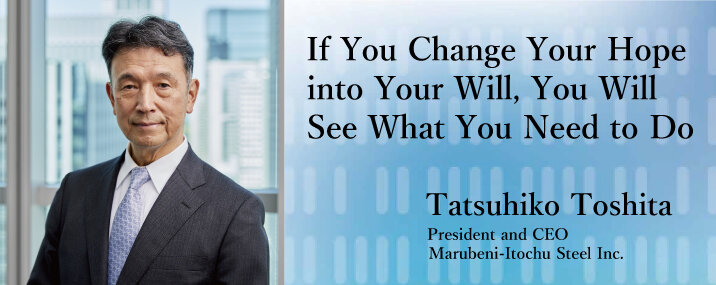Vol.29 Interview with Donors

Tatsuhiko Toshita
Born in Hyogo Prefecture in 1956. Graduated from Kyoto University's Faculty of Engineering in 1980. Joined ITOCHU Corporation in the same year. Stationed in Dusseldorf, Germany from 1995.
Transferred to Marubeni-Itochu Steel Inc. in 2001. Served as Executive Officer from 2010. Served as Director and Managing Executive Officer from 2013. Served as Director and Senior Managing Executive Officer from 2016. Served as Representative Director and Executive Vice President from 2017. Assumed his current position in 2020.
Q What were your days like at Kyoto University, including your time on
the American football team?
After failing my college entrance examinations as a third-year high school student, I had the opportunity to visit Kyoto with my father. My father was a graduate of Kyoto University, and I was impressed by the way he happily told me about the place where he had lodged, even though he was usually quiet. That made me once again think about Kyoto University, and I was able to pass the entrance examinations on my second try. Kyoto University had the same atmosphere as my favorite quote by Saneatsu Mushanokoji: "You are you, I am I, but we get along well."
I joined the American football team as soon as I entered the university because, although I had played basketball in junior high and high school, I wanted to play an outdoor sport. In 1974, the year before I entered Kyoto University, Yaichi Mizuno took over the football team as head coach. His coaching methods were attracting a lot of attention and the team was beginning to grow in strength.
Coach Mizuno and the other coaches of the time were very thorough in their approach to backcasting. Backcasting is a method of setting a target future from which to look back and consider what needs to be done in the present. For all teams, the goal is to win the game as they go into the game. So what do we need to do to win?
At that time, with few experienced players and limited practice time, it was important to raise the level of the team and what mattered was how quickly the team could get its inexperienced players ready to compete. In everything, including athlete health management, efficient practice methods, and recruiting, it was imperative to thoroughly implement the best way to win, without getting caught up in existing ideas.
We cannot win just by hoping to win. It is important to turn the hope of winning into willpower. From the moment you make this change, you will become able to see the path of what to do. These are the words from Coach Mizuno's teachings that have stayed with me strongly. Once your will is set, you will be prepared and able to govern your own actions. Our dream of beating Kwansei Gakuin University came true in 1976, when I was a sophomore, but in fact we came very close during my freshman year. The game went almost exactly as planned, but a touchdown was scored right in front of my eyes in the 4th quarter when victory was in sight, and the other team managed a come-from-behind victory. This frustrating experience certainly motivated me to continue playing football.
Q You even served as a coach in your fifth year. What do you think
your experiences at Kyoto University and on the American football
team have brought to your later life?
After entering specialized training, I began to wonder vaguely what kind of life I wanted to lead and what my career path would be. Unable to come up with an answer, I could not get the idea of giving back to the football team out of my mind, so I eventually decided to stay in school. I turned down a job offer and transferred to a different laboratory. Although I had inconvenienced many people, in the end I thought to myself, "I have no choice but to look at myself by trying my best to do what needs to be done."
The football team was traditionally coached by graduate students at the time, so I volunteered as a student repeating a year, and I would say that contributing to the team by coaching younger students was a valuable experience that I find useful to this day. In American football, each player has to develop different abilities, such as body size, footspeed, agility, and endurance, while working hard to achieve the goal of "winning" at each position. This is the same in organizational management.
I am not sure whether this is the reason, but many executives of various companies are from the same generation of American football players. It is an asset that I have been able to expand my personal relationships with many people through a common topic of conversation beyond the boundaries of the university through a single sport.
Q Is there a message you want to leave Kyoto University and
Kyoto University students with?
It is a wonderful characteristic of Kyoto University that because we have established ourselves, we are not bound by others, we respect each others' way of life, and we are able to pursue our own goals. On the other hand, it is also true that Kyoto University students tend to be content with their own world. I think the important thing is to communicate. If you put your thoughts into words and communicate them, they must be accompanied by actions, which also brings responsibility. Communicating your thoughts will bring opposition, criticism, and reactions from those around you, which will lead to awareness, learning, and growth. I think it is important to learn and grow by turning communicated thoughts into actions, and it is important to repeat this process.
Students are encouraged to think early on about what they want to live for and how they want to live. It is meaningful to think about this even if you do not get an answer. Thinking about life will help you have high aspirations and will motivate you to take on challenges.
(Interviewed in February 2022)


